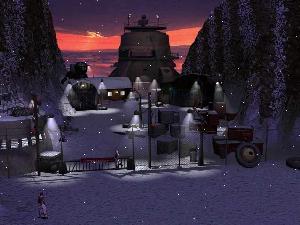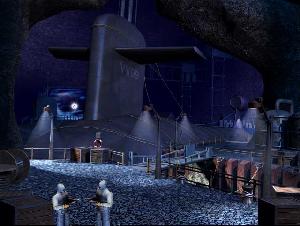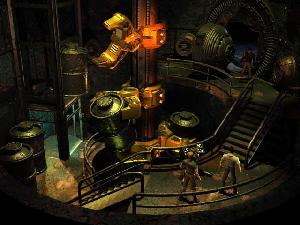Mama said there’d be days like this.
Most game consumers view the gaming press as overweight, overgrown children
who live secular, opulent lives of sitting on our butts eating junk food and
playing video games. While some of this may be true (everything but the opulence
part), anyone fortunate enough to land a reviewing job in the gaming industry
will quickly tell you how it ain’t all it’s cracked up to be. Often we find
ourselves enduring many sleepless nights, wrestling with uncooperative video
game characters, their dumbass enemies, retarded level designs and/or severely
somnolent gameplay. It ain’t all Half-Life.
Yeah, I know. Poor us.
Enter In Cold Blood, a Metal
Gear knockoff from Canadian developer Dreamcatcher. This title has been
roaming about in Europe for quite some time and has finally reached American
shores. Over the course of the game’s 9 missions, players will find a solid
story and a few neat Bond-style gadgets and weapons. But unfortunately, they’ll
also find crummy graphics and dull gameplay, leading to a game that is more
a chore than a delight.
At some point in the near future, the U.S. and The People’s Republic of China
are catastrophically close to engaging in all out war. Due to the growing threat
the Chinese present, the CIA requests support from the British Secret Service.
That’s the cue for our hero, John Cord, a special agent who’s latest mission
is about to go pear-shaped. The story is told in flashbacks, which is kind of
intriguing. You quickly realize that you’ve been setup and there is a select
few who you can trust. The story basically carries the entire game with the
help of some pretty FMV sequences.
In Cold Blood plays like a standard action/adventure title. As a spy,
Cord must do some rescuing, a lot of shooting, blowing up or defusing stuff,
etc. Talking to people and extracting valuable information is a must if you
are to succeed in your missions, some of which can really try your patience.
The third mission, for example, requires you to run back and forth ad nauseum
disabling robots. Very tedious and not very fun.
Cord does get to use some nifty little gadgets. Advanced communication devices,
electromagnetic pulse mines, computer hacking utilities, motion detectors and
other cool toys aid you in your quest.
What isn’t cool is the control. Moving Cord is an exercise in self-restraint,
as I had to restrain myself from taking a gun and shooting my computer until
it was dead …dead…dead! I tried all possible control options: control pad, keyboard,
and ‘screen relative’ controls (which I thought was point & click). All are
horrible. The only setup that leads to any success is with the control pad.
But even this gets incredibly frustrating, as a light tap left or right can
spin Cord around 180 degrees.
Furthermore, Cord can’t move backwards with his gun out, and forward movement
is a one step, then stop, one step, then stop affair. On the good side, all
the hair that I pulled out of my head may be used to patch that Friar Tuck balding
pattern a friend of mine is experiencing. Who needs the Hair Club for Men?
 Gunfights
Gunfights
are severely lacking in intensity. A heated battle consists of you and your
assailant standing 10 feet from each other firing your weapons. Since how fast
I press the button directly relates to how fast my gun fires (like a game of
Galaga), winning a one-on-one gunfight is very easy. The only way to
be beaten is to get attacked by more than one assailant, which is usually the
case.
Also, the prerendered backgrounds and stagnant camera angles make it really
hard to play it sly and sneaky. Your depth perception is thrown completely off.
Am I behind this filling cabinet? Blam! Apparently not.
If you ever played the old point-and-click Blade Runner
game for the PC, you know what this game looks like. For the rest of you, In
Cold Blood‘s backgrounds are all hi-res and pre-rendered (which means the
camera angles are static). The textures are nice and dark, which sets a great
mood for the espionage thing. The areas look good and get the job done well.
They remind me a lot of the pre-rendered settings in Final
Fantasy VII – solid, but dated.
On the flipside, character movement and animation is terrible. On a 700 MHz
AMD with 192 MB RAM backed by a GeForce
2 Ultra, the character still looks out of focus and pixilated. Sneak up
behind a guy to deliver a conscious-stealing blow to the back of the neck and
the lack of animation becomes brutally apparent. Hit the guy, now he’s on the
ground. There’s no falling animation or anything. Can someone tell me what year
this is? [2001, Shawn – Ed.]
Unfortunately, Dreamcatcher has produced a template for a good game, but the
execution is flawed. The solid story, decent backgrounds and cool gadgets just
aren’t enough to offset the lame animation, awful control and bland action.
But more importantly…the next time you run across one of your not-so-friendly
neighborhood gaming editors, give them a smile. Slap ’em a high-five. Offer
a cup of coffee or tea and some Visine. Pat him/her on the back and voice a
heartfelt “Keep up the good work” and send them on their way. Trust me, we could
use it.

-
Solid story
-
Nifty gadgets
-
Terrible control
-
Terrible animations
-
Terrible action







